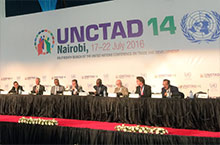ACP Group highlights special needs of poor, vulnerable countries at UN Conference on Trade & Development
 Nairobi, Kenya, 22 July 2016/ ACP: The ACP Group of States reaffirmed its support for a renewed four-year mandate for the United Nations Conference on Trade and Development (UNCTADXIV), with particular attention to the special needs of the poorest and most vulnerable economies of the world.
Nairobi, Kenya, 22 July 2016/ ACP: The ACP Group of States reaffirmed its support for a renewed four-year mandate for the United Nations Conference on Trade and Development (UNCTADXIV), with particular attention to the special needs of the poorest and most vulnerable economies of the world.
Amongst its membership, the ACP Group includes 39 Least Developed Countries (LDCs), 37 Small Island Developing States (SIDS), 18 Small and Vulnerable Economies (SVEs) and 15 Landlocked Developing Countries (LLDCs). They face particular challenges, characterised by commodity dependence; market concentration; low growth; macroeconomic and financial difficulties; trade deficits; and debt burdens, among others.
During the general debate of the 14th session of UNCTAD held in Nairobi, Kenya this week (17-21 July), ACP Secretary General Dr. Patrick I. Gomes called for the enhancement of UNCTAD's capacity to address the 2030 Agenda in support of all developing countries and economies in transition.
“We agree with the strong appeal to use trade in implementing the Agenda 2030. The momentum, from the international agreements [such as the 2030 Agenda for Sustainable Development, Addis Ababa Action Agenda, Paris Agreement on Climate Change and the Nairobi Declaration of the 10th WTO Ministerial Conference] has reinforced the critical role of trade and development and interrelated issues of finance, technology and investment for inclusive and sustainable development,” said the Secretary General.
“UNCTAD should further enhance its work on the special problems of the African continent; and as appropriate, accelerate its work on the special needs and problems of Small Island Developing States (SIDS), Landlocked Developing Countries (LLDCs) and other structurally weak, vulnerable and small economies,” he said about the Geneva-based UN body which helps developing countries to access the benefits of a globalised economy more fairly and effectively.
The ACP Group reaffirmed its full commitment to conclude talks on the Doha Development Agenda of the World Trade Organisation, where it is an influential negotiating group.
An ACP delegation, led by the Secretary General took part in various sessions at the week-long UNCTAD XIV conference, including the general debate, ministerial roundtables on the future of the multilateral trading systemand fostering green economies through trade, investment and innovation (represented by Assistant Secretary General Viwanou Gnassounou), a number of side events, including one on harnessing the blue economy in ACP countries, jointly organised by ACP, UNCTAD, CTA, and the ACP-EU programmes TradeComII and TBT, and events organised by the OIF on regional value chains as well as a ministerial meeting on the state of play of trade issues from the 10th WTO Ministerial Conference to UNCTAD XIV.
Aside from its focus on trade negotiations in the WTO and with the EU through regional Economic Partnership Agreements, the ACP Secretariat co-manages large-scale EU-funded programmes related to trade in ACP countries, such as TradeComII, TBT Programme (Technical Barriers to Trade) and Hubs and Spokes (implemented in partnership with the Commonwealth Secretariat and the Organisation Internationale de la Francophonie). These programmes focus on enhancing trade capacity in ACP countries, supporting governments in trade negotiations, as well as in the formulation of effective trade policies. Meanwhile, the joint ACP-EU Technical Centre for Rural and Agricultural Development (CTA) advocates for various aspects of sustainable agricultural trade.
Dr. Gomes stressed the need to seek out new sources of growth, as well as ensuring resilience and long-term sustainable growth through the structural economic transformation of ACP economies, including diversification to more technologically-advanced activities and higher value products.
He proposed tapping economic growth avenues in South-South cooperation such as through the strengthening of domestic markets of developing countries and the building of sub-regional trading and economic co-operation as Africa's CFTA.
“The ACP Group considers South-South and Triangular cooperation as fundamental avenues for enhancing the trade and development of developing countries in this critical time of multiple challenges,” he said.
Secretary General Gomes added that he looked forward to deeper cooperation between the ACP Group and UNCTAD, with which the group signed a memorandum of understanding in 1998.
– Press ACP
